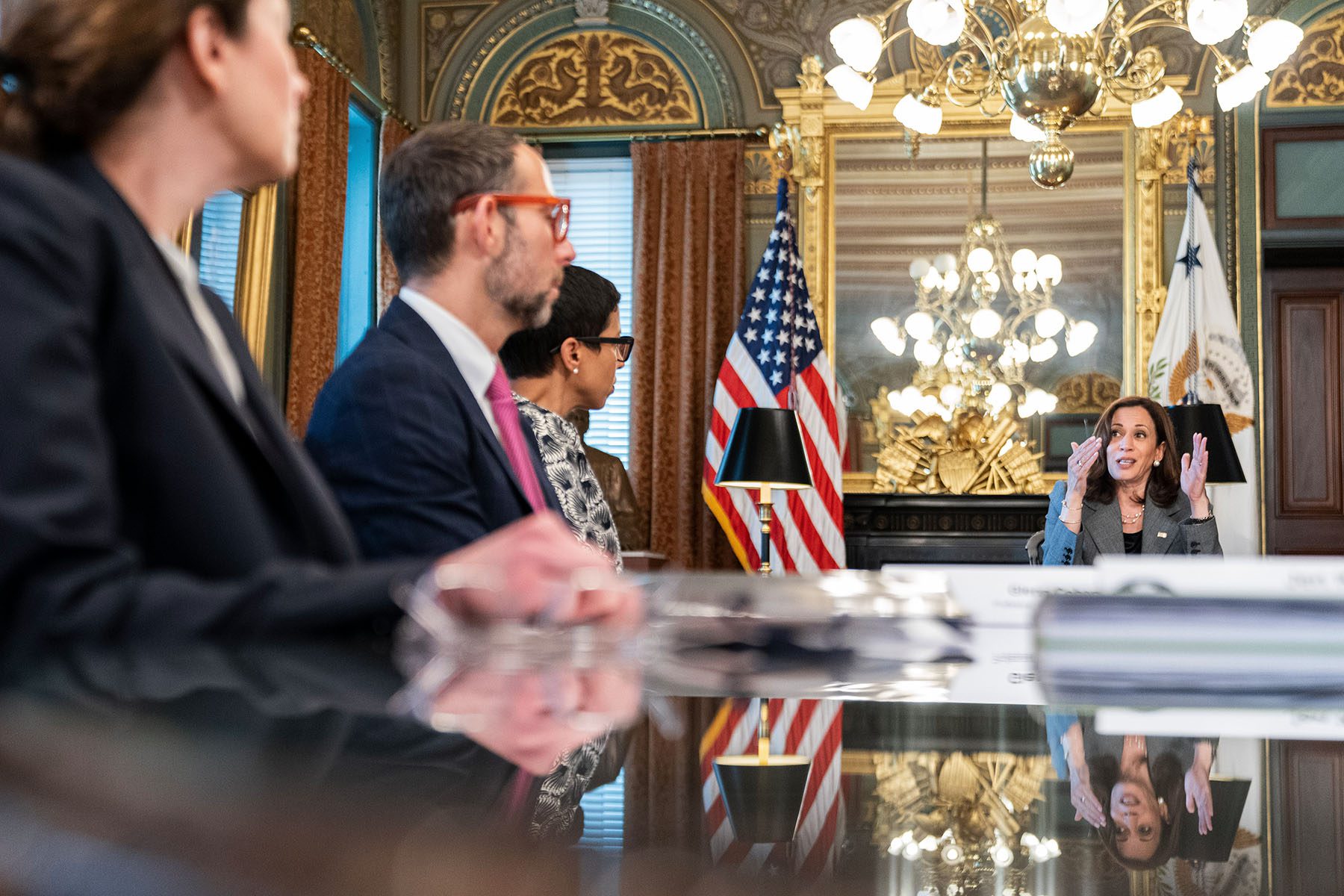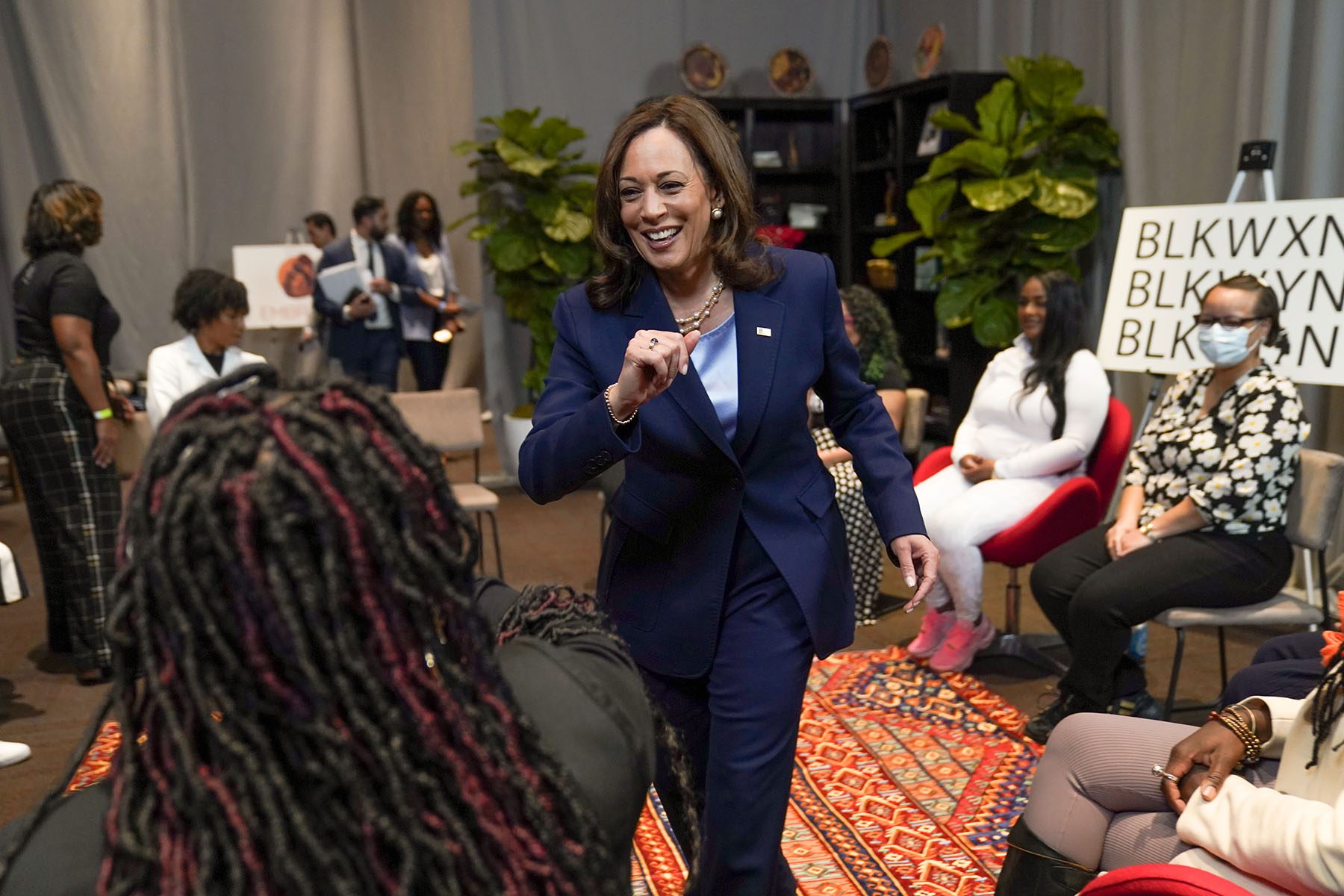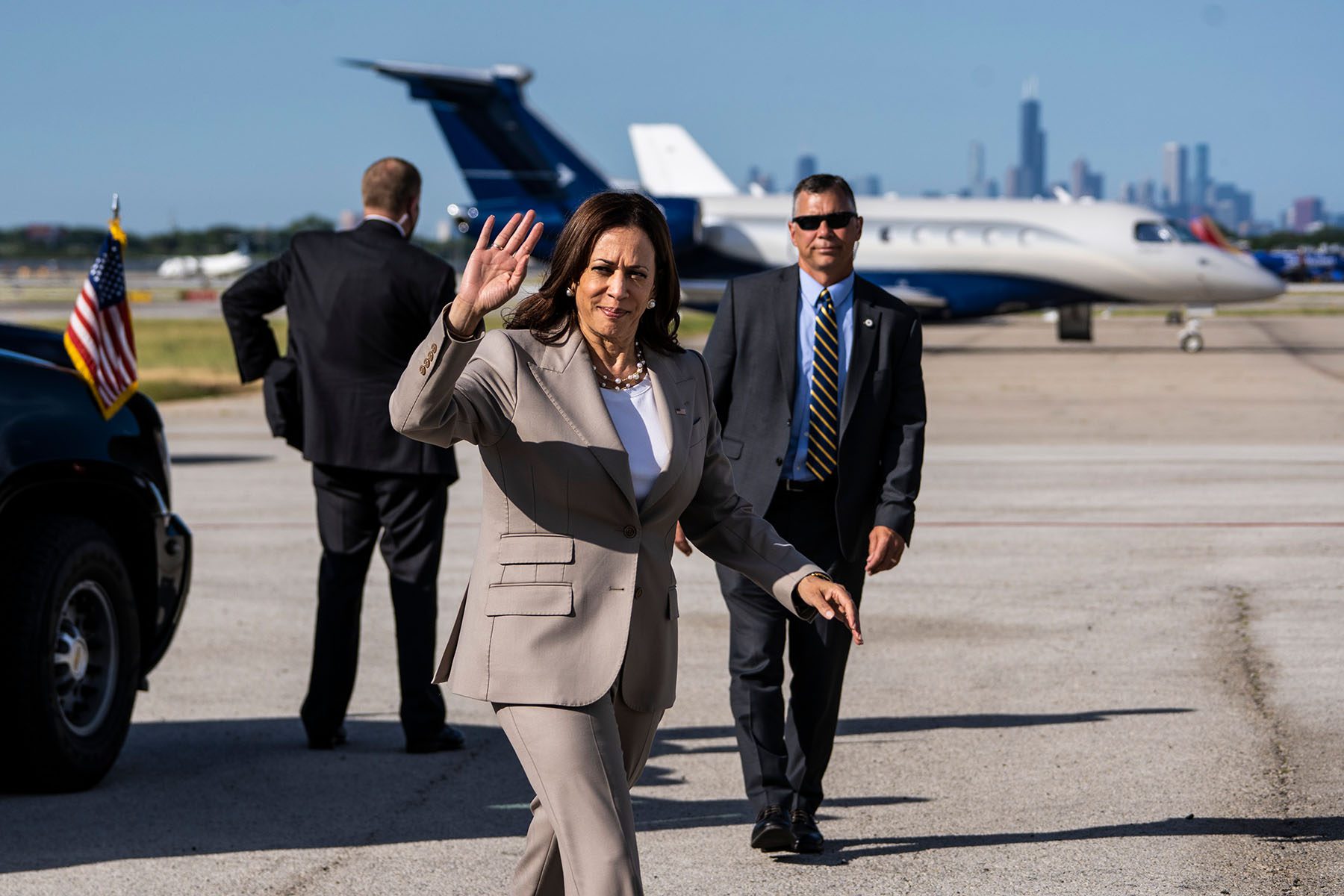Vice President Kamala Harris boarded a plane to Illinois on Friday to unveil her plan to address the country’s maternal health crisis. While she was in the air, she got the news that the Supreme Court had ended a nearly 50-year precedent and federal protections for abortion would no longer be the law of the land.
She read the opinion in flight and, later that afternoon, took the podium at a YMCA in Plainfield, on the outskirts of Chicago, to respond to the decision overturning the landmark 1973 Roe v. Wade ruling.
“As of right now, as of this minute, we can only talk about what Roe v. Wade protected — past tense,” Harris told the crowd. “This is a health care crisis. Millions of women in America will go to bed tonight without the access to the same health care that their mothers and grandmothers had for 50 years.”
As the administration and Democrats grapple with the Supreme Court’s ruling and what it will mean for millions of Americans, observers say Harris is uniquely positioned to respond — as the first woman vice president, but also a politician who has spent her career working to expand reproductive rights. But amid a vice presidential tenure marked by perceptions of inaction on key Democratic priorities, how and whether she can or will be effective is unclear.
“This certainly feels like a moment Kamala Harris was primed for,” said Supermajority Executive Director Amanda Brown Lierman. “I hope she fully steps into her own power to meet the moment; she has a lot of people looking to her, pushing her to do so. I hope that President [Joe] Biden and Vice President Harris are honest about the hard, sad, and long road ahead. We need people to stay in it, to be patient and vigilant.”
Ten days before the Supreme Court handed down the decision in Dobbs v. Jackson Women’s Health Organization, Harris met with constitutional law, privacy and technology experts to consider the stakes of the anticipated opinion, a version of which leaked on May 2.
Harris hosted a wide-ranging conversation that lasted about two hours, according to participants. She questioned the group about the potential impact of the decision and solicited ideas for how to bring together seemingly disparate coalitions to help Americans understand a post-Roe reality.
“She emphasized the importance of being able to talk with the American public, and being able to reach them, meaning, ‘Don’t be lofty, tell it like it is. Let’s make this plain because the American people need to understand what’s at stake, they need a translation,’” said University of California, Irvine constitutional lawyer Michele Bratcher Goodwin, one of the attendees.
“You couldn’t come away from that meeting without understanding that was an important part of her mission,” Bratcher Goodwin continued. “It wasn’t just about just holding onto the information and then sharing that with the president and leaving it there. It was clear what she wants is something that is broader than that.”
Since Justice Samuel Alito’s draft opinion leaked, Harris has met almost weekly with a range of groups that could factor into a national response to a post-Roe reality, shoring up their support and reiterating the administration’s commitment to defend reproductive rights.
In a meeting this week with state attorneys general, she urged them to look to each other for ways to expand access in their states and challenge their counterparts who were not in the room to brainstorm on other innovative ways to protect abortion rights. She encouraged privacy experts to explain to everyday Americans what is at stake, and her staff is following up to better understand the implications of the ruling and how the administration could respond. And after meeting with faith leaders, Harris’ public message has been that protecting reproductive rights doesn’t have to be at odds with a believer’s values, but only means they agree the government shouldn’t interfere in personal decisions.

The day after the leak, Harris addressed the annual EMILY’s List gala. In fiery remarks, she tied abortion to broader themes of democracy and liberty, telling the crowd: “Women’s issues are America’s issues, and democracies cannot be strong if the rights of women are under attack. So to all here, I say, let us fight for our country, and for the principles upon which it was founded, and let us fight with everything we have got.”
At the YMCA on Friday, though, Harris’ tone was more measured as she attempted to appeal to Americans to defend freedom, self-determination and the right to privacy.
“You have the power to elect leaders who will defend or protect your rights,” Harris said, echoing Biden’s call to Democrats to vote in the November midterm elections.
Biden, a Catholic who was first elected to the Senate a year before Roe, has evolved on the issue of abortion. While he has voiced his support for the precedent, the president has been reticent to actually use the word “abortion,” opting instead to use phrases like “access to health care” and focusing on “constitutional rights.”
Within hours of the Dobbs decision, Biden said he would do “all in my power to protect a woman’s right in states where they will face the consequences of today’s decision.” But he added that Congress must pass federal legislation to restore the abortion rights provided by Roe and said, “No executive action from the president can do that.”
Melanie Campbell, president of the National Coalition on Black Civic Participation, said the administration will need to use the bully pulpit with vigor to push back against what she sees as the erosion of rights across the country.
“They need to speak even more forcefully and passionately about what this means,” Campbell said. “This is a life-changing event for this nation … If you end up with the right mix of the wrong people in Congress, the Supreme Court and the White House, all bets are off.”
White House officials say Harris’ response builds on more than a decade of work on reproductive issues and that she foresaw the ominous signs about what might happen to Roe.
“This is something she’s had a long history on,” said Josh Hsu, who is counsel for the vice president. “She is so at home and so comfortable because she knows this issue so well.

As California attorney general from 2011 to 2017, Harris signed onto multiple friend-of-the-court briefs pushing for full access to reproductive health care and calling for pregnancy crisis centers to be transparent about their services.
In the Senate, she was a proponent of abortion access and introduced the Maternal CARE Act and Black Maternal Health “Momnibus” Act to address the racial disparities in pregnancy and childbirth. During Justice Brett Kavanaugh’s confirmation hearing, Harris, as a member of the Senate Judiciary Committee, asked: “Can you think of any laws that give government the power to make decisions about the male body?” (His answer: “I’m not thinking of any right now, Senator.”)
Harris continued to champion the cause as a candidate for president during the 2020 campaign, proposing a plan that would’ve required Justice Department approval for laws limiting abortion in certain states.
As vice president, she has continued to spotlight the issue, holding events during Black Maternal Health Week and convening Black women leaders. Friday’s announcement was the latest part of her work in this area, which she tied directly to the push for protections for reproductive rights.
In the nearly two years since she has held office, Harris’ portfolio has included voting rights and the root causes of migration, but it is on the issue of abortion where she has perhaps been more forceful and public in her response.
Brown Lierman said Harris’ message and tone so far has been the right one.
“Today, [Harris] shared the pain of millions of Americans,” Brown Lierman said. “She shared the righteous rage that women are feeling deep in their hearts and guts right now, and she called on us to vote. I do appreciate that message, because it’s what the Republicans have been doing for the last 50 years.”







